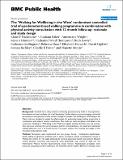Files in this item
The 'Walking for Wellbeing in the West' randomised controlled trial of a pedometer-based walking programme in combination with physical activity consultation with 12 month follow-up: rationale and study design
Item metadata
| dc.contributor.author | Fitzsimons, CF | |
| dc.contributor.author | Baker, G | |
| dc.contributor.author | Wright, A | |
| dc.contributor.author | Nimmo, MA | |
| dc.contributor.author | Ward Thompson, C | |
| dc.contributor.author | Lowry, R | |
| dc.contributor.author | Millington, C | |
| dc.contributor.author | Shaw, R | |
| dc.contributor.author | Fenwick, E | |
| dc.contributor.author | Ogilvie, D | |
| dc.contributor.author | Inchley, Joanna Catherine | |
| dc.contributor.author | Foster, CE | |
| dc.contributor.author | Mutrie, N | |
| dc.date.accessioned | 2014-04-28T15:31:00Z | |
| dc.date.available | 2014-04-28T15:31:00Z | |
| dc.date.issued | 2008-07-26 | |
| dc.identifier | 16601655 | |
| dc.identifier | 0e5914a3-2ed7-4c04-a475-5c5304d34bd0 | |
| dc.identifier | 50149096456 | |
| dc.identifier.citation | Fitzsimons , CF , Baker , G , Wright , A , Nimmo , MA , Ward Thompson , C , Lowry , R , Millington , C , Shaw , R , Fenwick , E , Ogilvie , D , Inchley , J C , Foster , CE & Mutrie , N 2008 , ' The 'Walking for Wellbeing in the West' randomised controlled trial of a pedometer-based walking programme in combination with physical activity consultation with 12 month follow-up: rationale and study design ' , BMC Public Health , vol. 8 , 259 . https://doi.org/10.1186/1471-2458-8-259 | en |
| dc.identifier.issn | 1471-2458 | |
| dc.identifier.other | ORCID: /0000-0001-8322-8817/work/65014251 | |
| dc.identifier.uri | https://hdl.handle.net/10023/4639 | |
| dc.description | This research was undertaken as part of work carried out by the Scottish Physical Activity Research Collaboration (SPARColl). SPARColl is managed by NHS Health Scotland, hosted by the University of Strathclyde, Glasgow and funded by the Scottish Government. | en |
| dc.description.abstract | Background: Scotland has a policy aimed at increasing physical activity levels in the population, but evidence on how to achieve this is still developing. Studies that focus on encouraging real world participants to start physical activity in their settings are needed. The Walking for Well-being in theWest study was designed to assess the effectiveness of a pedometer-based walking programme in combination with physical activity consultation. The study was multidisciplinary and based in the community. Walking for Well-being in the West investigated whether Scottish men and women, who were not achieving the current physical activity recommendation, increased and maintained walking behaviour over a 12 month period. This paper outlines the rationale and design of this innovative and pragmatic study. Methods: Participants were randomised into two groups: Group 1: Intervention (pedometer-based walking programme combined with a series of physical activity consultations); Group 2: Waiting list control for 12 weeks (followed by minimal pedometer-based intervention). Physical activity (primary outcome) was measured using pedometer step counts (7 day) and the International Physical Activity Questionnaire (long version). Psychological processes were measured using questionnaires relating to the Transtheoretical Model of Behaviour Change, mood (Positive and Negative Affect Schedule) and quality of life (Euroqol EQ-5D instrument). Physiological measures included anthropometric and metabolic outcomes. Environmental influences were assessed subje ctively (Neighbourhood Quality of Life Survey) and objectively (neighbourhood audit tool and GIS mapping). The qualitative evaluation employed observation, semi-structured interviews and focus groups. A supplementary study undertook an economic evaluation. Discussion: Data analysis is on-going. Walking for Well-being in the West will demonstrate if a pedometer based walking programme, in combination with physicalactivity consultation results in a sustainable increase in walking behaviour in this sample of Scottish adults over a 12 month period. The study will examine the complex relationships between behavioural change, health consequences and the role of the environment, in conjunction with the cost effectiveness of this approach and a detailed insight into the participants' experiences of the intervention. Trial registration: Current Controlled Trials ISRCTN88907382. | |
| dc.format.extent | 10 | |
| dc.format.extent | 309571 | |
| dc.language.iso | eng | |
| dc.relation.ispartof | BMC Public Health | en |
| dc.subject | RA0421 Public health. Hygiene. Preventive Medicine | en |
| dc.subject | SDG 3 - Good Health and Well-being | en |
| dc.subject.lcc | RA0421 | en |
| dc.title | The 'Walking for Wellbeing in the West' randomised controlled trial of a pedometer-based walking programme in combination with physical activity consultation with 12 month follow-up: rationale and study design | en |
| dc.type | Journal article | en |
| dc.contributor.institution | University of St Andrews. Child and Adolescent Health Research Unit | en |
| dc.contributor.institution | University of St Andrews. School of Medicine | en |
| dc.identifier.doi | 10.1186/1471-2458-8-259 | |
| dc.description.status | Peer reviewed | en |
This item appears in the following Collection(s)
Items in the St Andrews Research Repository are protected by copyright, with all rights reserved, unless otherwise indicated.

